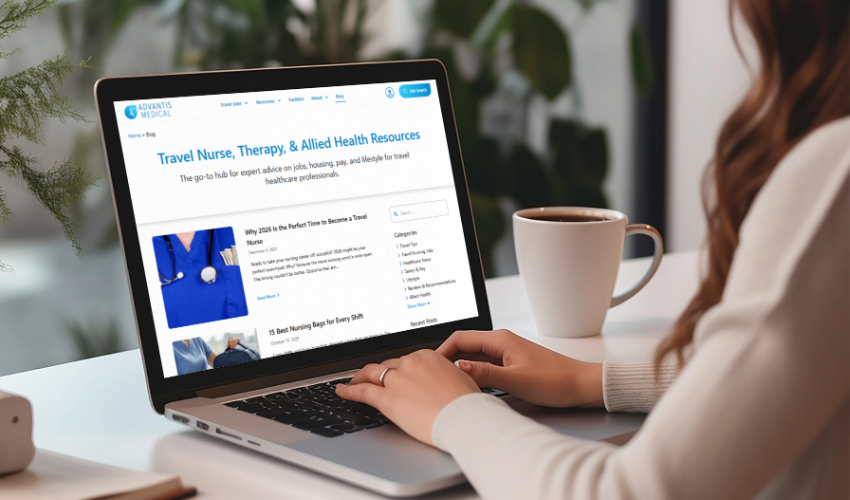Here are the facts: In 2020, 1 in 5 adults experienced a mental illness. The suicide rate has increased by 35% since 1999. Over 48 million Americans struggle with an anxiety disorder. Mental health conditions are rising, which makes Mental Health Awareness Month so important. Mental illness hangs tightly to its stigma though, and while we have increased our conversations about the effects of stress and anxiety on our lives, not everyone is given the same space and transparency. For the past 2 years, nurses have been tasked with undertaking duties many of us can’t fathom. Surrounded by constant death, loss, and fear, it’s not surprising that symptoms of anxiety, depression, insomnia, and psychological distress have risen dramatically.

Nurses struggle like the general population to manage their mental health in positive ways. Many brainwash themselves to believe this is the duty they signed up for. Some turn to alcohol or substances. Thousands more leave the profession altogether. Others tragically commit suicide.
A mental health epidemic may be the next crisis we face, but who will be there to treat and support patients if our healthcare workers aren’t physically, mentally, and emotionally stable? Mental Health Awareness Month is the perfect time for this conversation.
The Allied Health and Nursing Mental Health Crisis
Allied health and nursing are known for being high-stress professions. Nurses can cite constant contact with severe illness, death, and pain as a normal part of their day. Working short-staffed, juggling increasing responsibilities and demands of patients, and working overtime is commonplace. A pandemic only exacerbates the problem at hand. Research shows what nurses are experiencing is trauma. In fact, up to 40% of healthcare professionals will struggle with PTSD following the pandemic. Female nurses working directly with Covid-19 patients in the ICU or dedicated units have the highest risk of experiencing PTSD-like symptoms. Recognizing and treating mental health disorders is vital as a lack of intervention can lead to further dysfunction and death.
Mental health issues in nursing and allied health jobs didn’t manifest within the last 2 years. A 2017 study published in the American Journal of Nursing showed that 5.5% of American nurses had thoughts of suicide and were, unfortunately, less likely to seek help than nurses with another serious emotional issue. Suicidal ideation is strongly linked with burnout and U.S. nurses have a higher risk of suicidal ideation than other workers in the country.
What Can Healthcare Facilities Do To Prevent Mental Illness?
A 2018 study was able to link poor workplace conditions to the negative mental health and burnout of nurses. Results show that workplace safety, access to resources and supplies, organizational support, and relationships with colleagues significantly influence nurses’ mental health and their ability to provide effective care.
Hospitals and facilities must recognize the severity of the situation and direct their focus on improving work environments or risk continuing to lose their nursing workforce.
Healthcare Workers and Mental Health Awareness Month
Nurses are viewed as selfless healers with limitless amounts of compassion. Professional caregivers who support patients through some of the hardest times in their lives, yet feel they cannot show weakness themselves. Nurses know how detrimental poor mental health can be and the importance of assessing and intervening for their patients, but who takes care of them?
People not in a position to enact sweeping change can show support in many small ways. For example, there’s a mental health awareness color you can don to show support. During Mental Health Awareness Month, wear life-affirming green. Even better, wear that mental health awareness color while checking in on someone you think can use it. If that someone is you, don’t hesitate to use the resources below.
What Nurses Can Do to Improve Their Mental Health
Nurses must take it upon themselves to prioritize their mental health. Nurses often internalize the pain and suffering of their patients and continue to dwell on negative and traumatic situations. Developing moral resilience is one way to combat this. Moral resilience allows the mind to process a situation without attachment – recognizing it cannot be controlled. Resilience is built through practicing mindfulness and deep breathing to deactivate negative responses to stress.
Nurses Speaking Up
Nurses must join the conversation about their mental health struggles. Social support through friends, family, and organizations aids immensely in buffering against mental health disorders, and seeking support before and during a traumatic event can lessen psychological injury. Meaningful personal and professional relationships also curb burnout.
Nurses Setting Boundaries
Nurses often joke that they make the worst patients. They tell families that they can’t be efficient caregivers for their loved ones if they are pouring from an empty cup, yet many nurses last year didn’t take a vacation or even a weekend off in over a month. Kindhearted natures can stigmatize the need for self-care and help. Employers often take advantage of the altruistic nature of nurses, requiring overtime and instilling guilt to pick up extra shifts. Nurses must create boundaries and stick to them while employers recognize that an exhausted nurse isn’t an effective nurse.
Quotes for Mental Health Awareness
These quotes for mental health awareness are intended to fight stigma in mental health and to promote conversations. They can be posted on message boards or shared between friends who want to encourage constructive dialogue.
“Anything that’s human is mentionable, and anything that is mentionable can be more manageable. When we can talk about our feelings, they become less overwhelming, less upsetting, and less scary.
~Fred Rogers
“What mental health needs is more sunlight, more candor, and more unashamed conversation.
~Glenn Close
“You don’t have to be positive all the time. It’s perfectly okay to feel sad, angry, annoyed, frustrated, scared and anxious. Having feelings doesn’t make you a negative person. It makes you human.
~Lori Deschene
“There is hope, even when your brain tells you there isn’t.
~John Green
Mental Health Resources for Nurses
With most people eager and ready to move on from the restrictions and challenges caused by Covid-19, it isn’t that easy for nurses. Nurses are just getting to the point where they aren’t treating Covid-19 patients every day with less risk of passing the virus onto a loved one. Now is the time clinicians need beneficial, long-term support. The Well-Being Initiative provided through the American Nurses Association offers useful mental health resources for nurses and other essential workers.
Nurses can start by taking a 10-question stress self-assessment which will provide apps, peer support, guides, and toolkits for further support.
Happy offers a toll-free hotline (833) 327-0262, as well as an app for peer-to-peer support. Happy understands that employees are struggling with mental health, but aren’t utilizing their workplace’s employee assistance programs. Happy’s model focuses on proactive and preventative mental health care and is particularly useful in populations who are resistant to mental health care (healthcare workers themselves). Happy’s “Support Givers are often registered nurses, so you can talk to someone who gets it.
Therapy Aid Coalition is providing free (or very low-cost), short-term sessions to essential workers. Nurses can search for a therapist in their state and request a session.
Allied health workers and nurses have been placed on a pedestal as heroes, but they are not superhuman. They must recognize when it is time to take off their capes and focus on their own physical and mental well-being. This Mental Health Awareness Month, let’s acknowledge the magnitude of what our healthcare workers carry with them and support them in advocating for themselves.
How Advantis Medical Staffing Helps
To provide the best mental health support possible to travel nurses, allied health, and post acute care travelers, the travel nursing agency has employed seasoned nurses into their internal team. Nurses are a valuable asset to in understanding what Advantis Medical Staffing can do better and shaping their initiatives to improve the lives of travelers.
Over the course of just a few months, a Nurse Care Team was established to create companionship, provide support, mental health resources, day-to-day help, and more. The Nurse Care Team is also working on creating “Day 1 travel guides with comprehensive information about facilities, recreational activities in surrounding areas, and tips for a smooth work day.
Clinical managers at Advantis Medical Staffing constantly advocate for the well-being of healthcare workers. They keep close contact and strong communication lines with facilities to ensure the best practices are being employed. If an experience is reported to be unpleasant and a threat to the mental health of a healthcare worker, they actively find solutions to improve working conditions.
Start your travel nurse, nurse, allied health, or post acute care journey with Advantis Medical Staffing knowing your mental health is priority. Sign up on the AdvantisConnect job portal to start viewing available assignments across the US.









